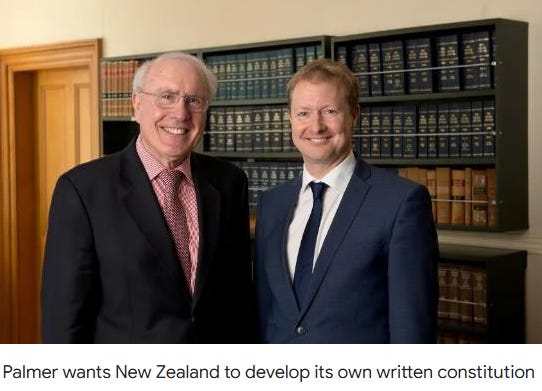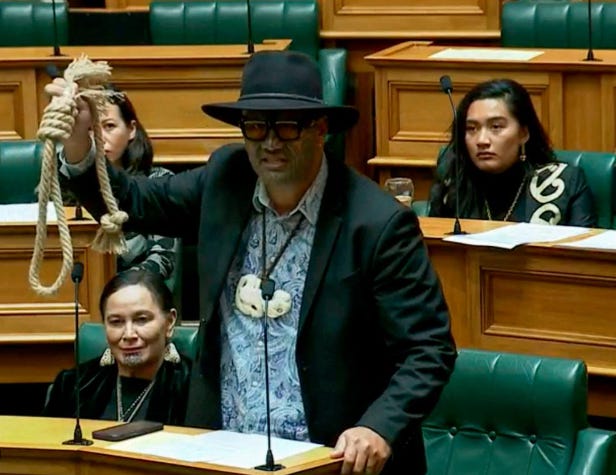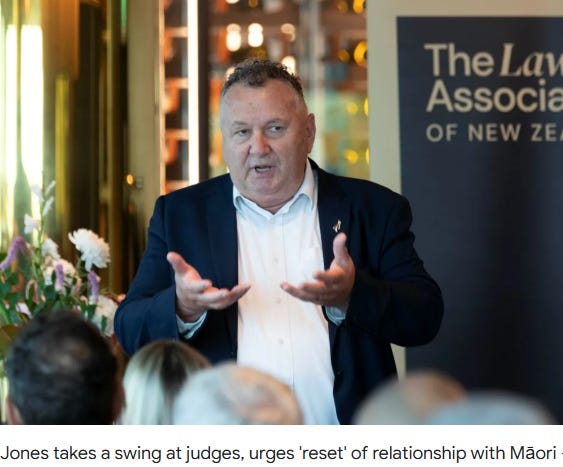As a child, I believed my grandmother simply started knitting, without an end in mind, and on each occasion an unforeseen woolen item would magically take shape.
I felt much the same when I began reading tracts of Sir Geoffrey Palmer’s screeds of words. He seemed to me to be aimlessly banging away at his keyboard, invested with nothing but inchoate hope for a useful result.
But what’s Sir Geoffrey really been up to?
On closer inspection, however, Palmer’s torrents of tapping are imbued with both method and direction. Geoffrey’s tomes of typing exhibit a recurrent theme.
Palmer detests unfettered Parliamentary sovereignty - and undiluted democracy. He harbors in his bosom nothing but contempt for all us common people and our elected Parliamentarians. Not too deep down, Palmer is every bit an archetypal anti-democratic, pseudo-intellectual snob, whose self-styled vocation is to napalm New Zealand’s democracy and defoliate its ordinary citizens.
Let’s point the flamethrower at Sir Geoff, apply heat and shed light on what the ex-Prime Minister has really been up to, over all his adult years.
Palmer detests unfettered Parliamentary sovereignty - and undiluted democracy. He harbors in his bosom nothing but contempt for all us common people and our elected Parliamentarians. Not too deep down, Palmer is every bit an archetypal anti-democratic, pseudo-intellectual snob, whose self-styled vocation is to napalm New Zealand’s democracy and defoliate its ordinary citizens.
Let’s point the flamethrower at Sir Geoff, apply heat and shed light on what the ex-Prime Minister has really been up to, over all his adult years.

Palmer first fully displayed his true colours with this 1979 book Unbridled Power, in which he expressed his feigned dread of that most dangerous phenomenon…democratically elected Governments passing laws and running the country, unmolested by unelected, activist judges. (Where were Geoffrey’s benevolent and heroic Judges when the last Labour Government rode COVID roughshod over our supposed Bill of Rights Act protections?…nowhere to be found. Living Judge Frank Cooke, son of dead “Treaty Partnership” Supremo Jurist Robin Cooke, was the only jurist to conscientiously resist Cult COVID.)
When Palmer blubs out his fears of Government excesses, he’s crying crocodile tears. If a majority of us don’t like a Government, we elect a new Government to pass new laws and change how our country is run. That’s democracy in nutshell, dear Geoffrey. And he knows it. Geoffrey doesn’t fear Big Government. He loathes the great, unwashed mass of New Zealand’s citizenry, and the politicians they elect.

Building on his elitist, antidemocratic prejudices, Palmer’s 2016 book A Constitution for Aotearoa New Zealand (co-authored with fellow lawyer Andrew Butler) suggests that judges should control the shop, as follows:
- Aotearoa?! New Zealand should have a comprehensive written constitution
- Courts should be entitled to strike down – American-style - laws inconsistent with the constitution
- Such judicial strike-downs should only be able to be overridden by a Parliamentary supermajority (75%) or a citizen’s referendum
The Treaty, a simple document - cession of sovereignty to a unitary Government (Article 1)/Maori keep their chiefly fiefdoms and other stuff (Article 2)/otherwise equal citizenship (Article 3) – has nothing whatsoever to contribute towards the detail of any written constitution.
But my plodding logic seemed lost on Andrew. He smiled and trotted off. (The title of Palmer/Butler duo’s second (2018) book, Towards Democratic Renewal, is clearly some sort of sick joke.)
Palmer’s initial Act of Treaty Principles Treachery was back in 1986 when, as Minister of Justice (just before his brief term as Prime Minister), he inserted the following constitutional cluster bomb into the State-Owned Enterprises Act 1986:
“Nothing in this Act shall permit the Crown to act in a manner that is inconsistent with the principles of the Treaty of Waitangi.”
That insertion opened the door for New Zealand’s Court of Appeal (Robin Cooke), in its 1987 decision in New Zealand Māori Council v Attorney-General, to ordain that “The Treaty created an enduring relationship of a fiduciary nature akin to a partnership”…opening the door for race activists’ aspiration for a Race Based Two State “Solution” for New Zealand – Apartheid Aotearoa.
“Treaty Principles” references have now infected at least 40 separate New Zealand statutes. These invented Treaty Principles have been kept deliberately obscure, with only elite Maori Mullahs and a smattering of honorary Maori (tiki-wearing) Pakeha anointed to interpret and invent them. The Treaty Cant is out of the bag.
Down through the years Palmer has continued to pursue and promote his dystopian Ethno-State, Judge-controlled, Aotearoa, under the guise of seeking to limit the powers of elected Governments.

And Sir Geoff cuts up mighty rough when his Treaty Principles Edifice is threatened. In petulant submission against the ACT Party’s Treaty Principles Bill, Palmer submitted that merely proposing the Bill had “damaged the collective fabric of the nation”…it’s as if Geoff genuinely believes that commandeering the apparatus of State to classify and divide all New Zealanders by racial ancestry would help strengthen New Zealand’s “collective fabric”.
Palmer continues to contort his capacious cranium in his crusade to extinguish true democracy in New Zealand. In reaction to Parliament’s Privileges Committee temporarily suspending Maori Party co-leaders Rawiri Waititi and Debbie Ngarewa-Packer from Parliament, together with their Maori princess pawn Hana-Rawhiti Maipi-Clarke, Palmer claimed the suspensions “risked undermining the rule of law”.
You may detect that I’ve lost my sense of humour when it comes to Sir G. But humour and irony are entirely foreign concepts for Geoffrey. So the irony of Palmer claiming that the TPM suspensions threatened the rule of law is lost on him. Because, of course, it was the Waititi/Packer/Maipi-C Triumvirate itself that was overtly threatening the rule of law, by brazenly trying to intimidate fellow Parliamentarians as they tried to vote on the Treaty Principles Bill. That trio led the premeditated haka, with Pakeha-predominant Packer pointing her pretend (finger) pistol at ACT MPs.
But in Sir Geoffrey’s warped world, his “bad look for the rule of law” was not the Maori Party MPs’ deliberately disrupting democratic voting in Parliament. Geoff’s alleged “bad look” was the predictable punishment of their unprecedented anti-democratic disruption, meted out by a majority of their fellow MPs.

Mercifully, more worldly and wise figures are alive to the pernicious plans of Palmer and his fellow legal luminary subversives.
At a recent breakfast hosted by The Law Association, Attorney-General Judith Collins laid it out for New Zealand’s activist judiciary, in characteristic Crusher style:
“It is important that the judiciary considers under our common law system, how perhaps the law can be developed in a way that doesn’t surprise and shock. Surprise and shock is not good, and if that happens, it can invite a response from Parliament that may well be seen as necessary.
The judiciary cannot also usurp the executive and legislature, which undermines the system for everyone.
While our common law method, of course, allows judicial development of the law, it has to be done very carefully, incrementally and being alert to the need to preserve certainty, stability and coherence in the law.
We all need to respect the roles each branch of government plays, even when, in fact especially when, it’s inconvenient to do so.
The law needs to be certain, and if tikanga is to be part of the law then it needs to be codified, so people know what all this means.
Also, this hasn’t been through Parliament. It would be wrong to consider that every iwi or hapu’s tikanga is the same as someone else’s. Laws need to be universal in our country. So to me, it does cause some concern, particularly for litigants who don’t know what this means.”
“Do not have laws that invite the judiciary to interpret what you might think about something”.

In the same vein, at another recent function hosted by The Law Association (a lunch), NZ First MP Shane Jones told his audience:
“I’m very wary when we put anything into the law of anything that provides the judiciary with an opportunity to hobble or trammel the sovereignty of Parliament. In that way, I’m very much a Westminster traditionalist.”
The National Party/NZ First coalition agreement commits the Coalition Government to:
Conduct a comprehensive review of all legislation (except when it is related to, or substantive to, existing full and final Treaty settlements) that includes 'The Principles of the Treaty of Waitangi" and replace all such references with specific words relating to the relevance and application of the Treaty, or repeal the references.
But distressingly, the horse has possibly already bolted and we may well all be off to the Two Races Aotearoa. Because even if the current Coalition Government proceeds to replace or repeal the plethora of “Principles of the Treaty” legislative references, it’s entirely possible nothing will change.
The crux of the threat to New Zealand’s democracy is that New Zealand’s upper Courts have abandoned any pretense of applying the literal meanings of legislative wording. In its 2021 decision, New Zealand’s Supreme Court – in relation “Three Strikes” sentencing - decided that the reference to “in this Act [the Sentencing Act] or any other enactment” somehow did not encapsulate the Bill of Rights Act 1990.
A series of subsequent New Zealand court decisions have embraced Orwellian notions that words don’t bear their ordinary meanings, or can be entirely ignored. Which means that elite judges are now hard wired to simply ignore legislation that they don’t like, including enactments passed by Parliament in attempts to remedy bad Court decisions.
In addition, New Zealand’s Supreme Court has repeatedly decided that New Zealand now has a trumping form of common law that gazumps both Parliamentary legislation and ordinary common law…TIKANGA.
If our elected Parliament replaces/repeals Treaty Principles references, the Courts may well respond by invoking Tikanga to reinject undefined Treaty Principles back into legislation, as they see fit. In which case, Sir Geoffrey Palmer will have consummated his lifelong dream of Judicial Supremacy over Parliament. New Zealand’s so-far bloodless but increasingly uncivil constitutional war rages on:
UNCIVIL WAR
John McLean
·
30 August 2024

The conflict is hot and will only get hotter. Figurative flames, ballistics and scalding hot air are blasting from multiple flues, in every direction. In all the hullabaloo, woo-woo, boo-hoo and utu, few have a clue about this attempted coup. Do you?
Read full story
John McLean is a citizen typist and enthusiastic amateur who blogs at John's Substack where this article was sourced.


16 comments:
Your assessment of Palmer is spot on. He is so far up his own academic fundamental passage that he is totally out of touch with reality. He’s always been the same - college, university and law.
It is time Judith stepped up. Making nice speeches about staying in your lane means nothing without the means to back it up. Our supreme court should be collectively removed.
The replacements being warned, stick to your jobs or face the same result. They can, should, be completely independent, but that doesn't mean they get to override Parliament.
Sir GP , acutely aware his ideology was seditious, chose to repeal those sections of the Crimes Act. Not much noticed by anyone! But he knew any suggestion of trying to remove treason from the law, would make the intention of his ideology clear to all. That he knew where his divisive policies would lead brands him as a treacherous quisling.
The arch-privileged.
Radical activists- in plain sight. As silly Aotearoans star gaze and drool over matariki. Tragic - in the Greek sense.
Machiavelli - with an outrageous ego.
Palmer is behaving exactly like the original colonist masters. They know best, those without their education or privilege should not have a say.
I detest that kind of person
It is way past time for the government to reign in these woke judges.
A judge's proper function is to enforce parliament's laws, NOT to twist them or re-interpret them.
Most of Palmer's grand ramblings have been beyond me. But the unbridled power aspect of our governements is now especailly worrying. A maori dominated Labour coaltion, a very real possibility, taking the present govts sweeping actions as precedence, will wreak true havoc and destroy NZ
The TOW is not a founding document, as it founded nothing.
Our founding document is the Formal Royal Charter/Letters Patent dated 16th November 1840 and which was enacted on May 3rd 1841.
Article 2. (to be clear) The chiefs the hapus and ALL THE PEOPLE OF NEW ZEALAND the full chieftainship of their lands, their settlements and their property.
“The factor that shaped my intellectual approach to Maori issues in NZ was my experience in the United States. It was on this background that I drew, and with adaptations used as the basis for legislation to advance the interests of the Maori minority in NZ. I did some research on the outstanding grievances and it did not appear to me that looking into them would open the can of worms, which many feared. I took the view that the claims may take a decade to deal with, that it would cause some anguish but it would be worth it in the end.” Geoffrey Palmer
(So based on the American civil rights movement experienced while studying in the US, a “can of worms” was opened in NZ)
In 2011, Bill English and Pita Sharples announced 12 appointees to a Constitution Advisory Panel, with Sharples stating. “An important part of this review process will be consultation with Maori, particularly on the place of the TOW in our Constitution. The members of this group are well placed to seek out and understand the perspective of Maori on these important issues”.
Mr Palmers 2016 "Constitution Aotearoa" blueprint includes in it the Role of the Treaty of Waitangi, which recognizes and upholds the “principles” of the Treaty of Waitangi.
So, the man responsible for allowing claims to date back to 1840, created “five principles” for crown action on the treaty, made the treaty into a “partnership between the Maori and the crown” and wrote the majority of New Zealanders out of our legislation when Chief Justice Prendergast in 1877 had ruled the treaty “a simple nullity” and the Law Lords of the Privy Council stating, “The Treaty of Waitangi was not a legally binding document”, wants to write our new constitution for apartheid Aotearoa does he
On partnership and principles: To have a partnership, you must have two or more people. How can you have a partnership when we are one people? Could Sir Geoffrey Palmer please explain in plain English how this can happen, not in legalese? I once had absolute trust in the legal profession, but it is now become obsolete!
Kevan
Palmer is no more or less important than any other New Zealander. In a democracy we are all equal. W e can't suddenly have a handful of people dictating to the rest. That is called a dictatorship. If most New Zealanders can see this, why can't our politicians? Ardern showed how dangerous this path can be. Luxon is following suit as it seems these leaders are starstruck by the judiciary. I have an eminent family member(barrister) who studied under Palmer. He entered university a "normal" person and became quite radical left in his thinking.
True - and routinely ignored.
Fully agree. Supreme Court is a disgrace..... has been for decades. W e a k and b i a s e d.
That cur (sic) Geoffrey Palmer should have a knighthood is a travesty, it should be stripped from him. He and the likes of traitor Finlayson have collectively been putting the proverbial boot into NZ for way too long.
I've posted some of this before but I now feel we need to be pestering our MPs to bring this back to the Crimes Act. Sedition ... It is kinda anomalous that in 2007 the Govt of the Day moved to repeal sedition laws, done under the guise of protecting democracy and free speech - no joke this is what they said then! The third reading is interesting: https://www.parliament.nz/en/pb/hansard-debates/rhr/document/48HansD_20071024_00000979/crimes-repeal-of-seditious-offences-amendment-bill - Winston Peters and Ron Mark made some good points. Who was heading the Law Commission that recommended the repeal? Sir Geoffrey Palmer. Yep, him again - thanks for the blessed nebulous, non-existent principles of the Treaty by the way Sir! These words were uttered by Winston Peters during that 3rd reading "example, inciting racial disharmony is not really the core of the sedition legislation. Sedition is about the promoting of rebellion and anarchic acts that have nothing to do with democracy or a vote, but, rather, to supersede the will of the people—"
... I cannot be alone in thinking we could well do with the sedition laws again to deal with certain elements that have emerged and that blatantly seek to subvert the will of the people? I say get stuck in and ask our MPs to do this.
Post a Comment